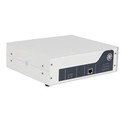Hey there! I'm a supplier of ultrasonic filtration systems, and today I want to dig into an interesting question: Can an ultrasonic filtration system be used for biological filtration?
Let's start by understanding what biological filtration is. In simple terms, biological filtration is a process that uses living organisms, like bacteria, to break down and remove harmful substances from a liquid or gas. This is super important in many areas, such as wastewater treatment, aquariums, and even in some medical applications. The bacteria convert toxic compounds, like ammonia and nitrites, into less harmful substances, like nitrates.
Now, let's talk about ultrasonic filtration systems. These systems use ultrasonic waves to enhance the filtration process. Ultrasonic waves create cavitation bubbles in the liquid. When these bubbles collapse, they generate high - energy shockwaves. These shockwaves can help dislodge particles from the filter media, preventing clogging and improving the overall efficiency of the filtration.
So, can these two concepts work together?
Advantages of Using Ultrasonic Filtration for Biological Filtration
1. Preventing Clogging
One of the biggest challenges in biological filtration is the clogging of the filter media. As bacteria grow and form biofilms, along with the accumulation of organic matter, the filter can get blocked. This reduces the flow rate and the effectiveness of the filtration. An ultrasonic filtration system can be a game - changer here. The ultrasonic waves keep the filter media clean by dislodging the accumulated particles. For example, in a wastewater treatment plant, where large amounts of organic matter are present, an Ultrasonic Tank Filter can prevent the clogging of the biological filter beds, ensuring a continuous and efficient treatment process.
2. Enhancing Bacterial Activity
The shockwaves generated by the ultrasonic cavitation can also have a positive impact on the bacteria involved in biological filtration. They can increase the mass transfer of nutrients and oxygen to the bacteria. In an aquarium, for instance, a well - oxygenated environment is crucial for the growth and activity of the beneficial bacteria that break down fish waste. An Ultrasonic Pipe Filter installed in the water circulation system can help distribute oxygen more evenly, promoting the growth of these bacteria and improving the overall water quality.
3. Reducing Maintenance
Traditional biological filtration systems often require frequent maintenance to clean or replace the filter media. This can be time - consuming and costly. With an ultrasonic filtration system, the need for such frequent maintenance is reduced. The self - cleaning nature of the ultrasonic system means that the filter media can last longer, saving both time and money for the end - user.


Challenges and Considerations
1. Impact on Bacteria
While ultrasonic waves can have some positive effects on bacteria, there is also a risk of harming them. High - intensity ultrasonic waves can cause damage to the bacterial cells. The key is to find the right balance. The frequency and intensity of the ultrasonic waves need to be carefully adjusted so that they clean the filter media without killing the beneficial bacteria. Research has shown that low - frequency ultrasonic waves in the range of 20 - 40 kHz are generally more suitable for biological applications as they can generate enough cavitation for cleaning while minimizing the damage to bacteria.
2. Compatibility with Filter Media
Not all filter media used in biological filtration are compatible with ultrasonic filtration. Some delicate media may be damaged by the ultrasonic shockwaves. For example, certain types of porous ceramic media may crack or break under the influence of high - energy ultrasonic waves. It's important to choose the right combination of filter media and ultrasonic settings to ensure the long - term performance of the system.
3. Cost
Implementing an ultrasonic filtration system for biological filtration can be more expensive than traditional methods. There is the cost of the ultrasonic equipment itself, as well as the energy consumption. However, when considering the long - term savings in maintenance and the potential for improved filtration performance, the investment can be justified in many cases.
Real - World Applications
1. Aquaculture
In aquaculture, maintaining good water quality is essential for the health and growth of fish and other aquatic organisms. Biological filtration is commonly used to remove ammonia and other waste products from the water. An ultrasonic filtration system can enhance this process. By preventing clogging and promoting bacterial activity, it can help keep the water clean and reduce the risk of disease outbreaks. This leads to better growth rates and higher survival rates of the aquatic animals.
2. Wastewater Treatment
Wastewater treatment plants deal with large volumes of sewage and industrial waste. Biological filtration is a key step in the treatment process. Ultrasonic filtration can improve the efficiency of these plants by ensuring that the biological filters operate at their best. It can help meet the strict environmental regulations by removing more pollutants from the water before it is discharged back into the environment.
3. Medical and Pharmaceutical Industries
In some medical and pharmaceutical applications, biological filtration is used to purify liquids. For example, in the production of vaccines, the removal of impurities and contaminants is crucial. An ultrasonic filtration system can be used to enhance the biological filtration process, ensuring the purity and safety of the final product.
Conclusion
So, can an ultrasonic filtration system be used for biological filtration? The answer is yes, but with some careful considerations. The advantages, such as preventing clogging, enhancing bacterial activity, and reducing maintenance, make it a very attractive option. However, challenges like the potential impact on bacteria, compatibility with filter media, and cost need to be addressed.
If you're in the market for a filtration solution for your biological filtration needs, I'd encourage you to consider an ultrasonic filtration system. Our company has a range of high - quality Ultrasonic Tank Filter and Ultrasonic Pipe Filter products that can be customized to meet your specific requirements. If you're interested in learning more or discussing a potential purchase, feel free to reach out. We're here to help you find the best solution for your filtration challenges.
References
- Chen, X., & Zhou, Y. (2018). Effects of low - frequency ultrasound on the performance of biological wastewater treatment processes. Journal of Environmental Sciences.
- Zhang, L., & Wang, H. (2020). Application of ultrasonic technology in aquaculture water treatment. Aquaculture Research.
- Smith, J. (2019). Ultrasonic - assisted biological filtration in medical applications. Pharmaceutical Science Journal.





